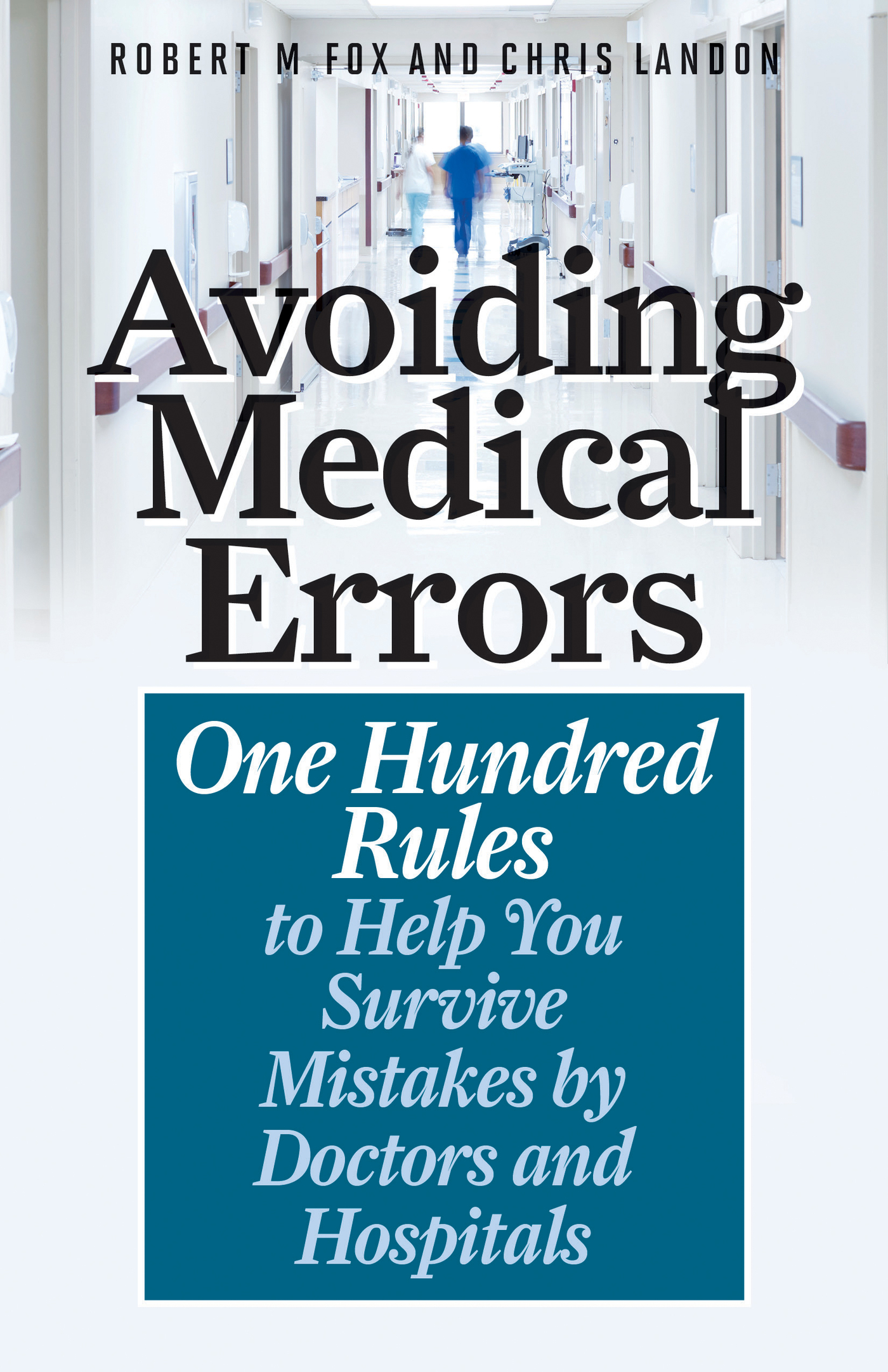Avoiding Medical Errors
Avoiding Medical Errors
One Hundred Rules
to Help You Survive Mistakes
by Doctors and Hospitals
Robert M Fox
Chris Landon
ROWMAN & LITTLEFIELD
Lanham Boulder New York London
Published by Rowman & Littlefield
An imprint of The Rowman & Littlefield Publishing Group, Inc.
4501 Forbes Boulevard, Suite 200, Lanham, Maryland 20706
www.rowman.com
6 Tinworth Street, London SE11 5AL
Copyright 2020 by The Rowman & Littlefield Publishing Group, Inc.
All rights reserved. No part of this book may be reproduced in any form or by any electronic or mechanical means, including information storage and retrieval systems, without written permission from the publisher, except by a reviewer who may quote passages in a review.
British Library Cataloguing in Publication Information Available
Library of Congress Cataloging-in-Publication Data
Names: Fox, Robert M, 1925, author. | Landon, Chris, 1951, author.
Title: Avoiding medical errors : one hundred rules to help you survive mistakes by doctors and hospitals / Robert M. Fox, Chris Landon.
Description: Lanham : Rowman & Littlefield, [2020] | Includes bibliographical references and index. | Summary: Preventable errors by doctors, hospitals, and other healthcare providers are a major cause of death and disability in the US, comparable to cancer and heart disease. The rules explored in Avoiding Medical Errors help patients avoid becoming victims and address areas that might otherwise be overlookedProvided by publisher.
Identifiers: LCCN 2019051345 (print) | LCCN 2019051346 (ebook) | ISBN 9781538135716 (cloth) | ISBN 9781538135723 (epub)
Subjects: LCSH: Medical errorsPrevention. | AccidentsPrevention.
Classification: LCC R729.8 .F69 2020 (print) | LCC R729.8 (ebook) | DDC 610.28/9dc23
LC record available at https://lccn.loc.gov/2019051345
LC ebook record available at https://lccn.loc.gov/2019051346
 TM The paper used in this publication meets the minimum requirements of American National Standard for Information Sciences Permanence of Paper for Printed Library Materials, ANSI/NISO Z39.48-1992.
TM The paper used in this publication meets the minimum requirements of American National Standard for Information Sciences Permanence of Paper for Printed Library Materials, ANSI/NISO Z39.48-1992.
To all patients, wherever they may be.
Acknowledgments
First, and before all others, I thank my wife, Isabelle, for her understanding, patience, and assistance during the years I worked on the rules. She was a valuable sounding board through draft after draft. My coauthor and friend Chris Landon carefully reviewed each rule; his insight and comments were much appreciated.
Many othersboth professional and lay communitiesprovided help and encouragement. Although there are too many to name and thank, I would like to single out two of them: John T. James and Mark Scholz.
John T. James, PhD, retired chief toxicologist of the National Aeronautics and Space Administration, is the author of a detailed and carefully researched study of deaths due to errors in hospitals: A New, Evidence-Based Estimate of Patient Harms Associated with Hospital Care. This study was published in 2013 in the Journal of Patient Safety and elsewhere and supplied important foundational evidence for the entire patient-safety movement in the United States. This includes the landmark July 17, 2014, Senate committee hearing headed by Senator Bernie Sanders: More Than 1,000 Preventable Deaths a Day Is Too Many: The Need to Improve Patient Safety. Dr. James was very supportive of our interest in the patient-safety movement and rules concept. He encouraged us, and we thank him.
My thanks, also, to Mark Scholz, MD, medical director of prostate oncology specialists in Marina Del Rey, California, and executive director of the Prostate Cancer Research Institute. I am very grateful to Dr. Scholzs support and encouragement over the years.
Introduction
The Problem: Too Many Deaths
Let us imagine that two 747 jumbo jets carrying more than a thousand passengers crashed because of pilot error, killing all passengers. There would be a tremendous national uproargovernment investigations, a media frenzy, litigation by families of dead passengersand the outcry would be deafening and continuing. Then the next day, lets say that two more 747s crash, again killing more than a thousand passengers. And lets suppose that this goes onday after dayfor the entire year; more than a thousand people die each day due to pilots mistakes.
You are probably thinking that there is no way this could happen. Yet this is exactly what goes on each day in the United Statesbut not to airline passengers. More than a thousand patients in the United States now die in hospitals each daymore than 365,000 each yearbecause someone in the hospital (a doctor, nurse, technician, or someone else) makes a mistake that could be avoided. These preventable errors, and the terrible resulting death toll, have received:
Almost no media attention
Little discussion by government or private sources
No talk show discussion by experts
No screaming headlines in the daily press
No television appearance by our presidentor any other government officialto reassure the public and promise prompt action to stop these unnecessary and avoidable deaths
There are several reasons why there has been a wall of silence concerning these tragedies, with almost no public recognition or discussion:
Unlike an aircraft crash, these deaths do not occur dramatically at the same time and place. They occur quietly at hundreds or thousands of different hospitals scattered all over the United States, and they occur at different times of the day and night. Many are not even reported in the local press. Knowledge of the deaths is generally unknown except for the families and hospital personnel involved. Only rarelyif a celebrity is involveddoes the death even become known and attract local or national attention.
Such deaths are rarely reported or recorded as occurring due to preventable errors. There is understandable reluctance by doctors, hospitals, or risk management personnel to either admit or record any evidence of wrongdoing.
None of us, including the families and others who know of these deaths, want to believe that doctors and other healthcare providers could be responsible for so many preventable deaths. Most us want to trust our doctor. We like to think of our doctor as an all-wise parent. Throughout the ages, we have relied upon those with special wisdom and powersfrom ancient medicine men to the highly qualified and trained specialists of modern medicine. Our tendency is to passively trust and retain faith in our doctors. We feel unqualified to solve our own medical problems and are reluctant to criticize or think negatively about our doctors. For most of us, medical diagnosis and treatment are a mystery. This attitude is understandable because we rely on doctors to make life-and-death decisions. We want to believe and to trust that they will wisely and safely treat us.
But on July 17, 2014, some grim, disturbing, and convincing facts came to public attention that should compel all of us to reevaluate our faith in the integrity and safety of our medical system. On that date, in Washington, DC, witnesses testified before the US Senate Subcommittee on Primary Health and Aging, chaired by Senator Bernie Sanders of Vermont. The title of the hearing was More Than 1,000 Preventable Deaths a Day Is Too Many: The Need to Improve Patient Safety.
Next page
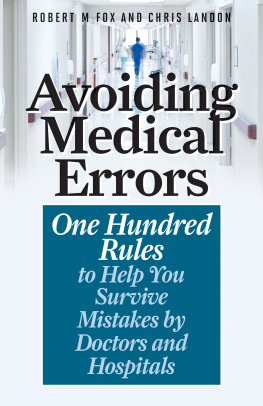

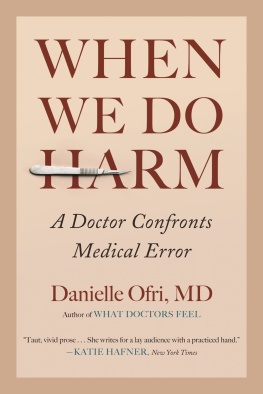
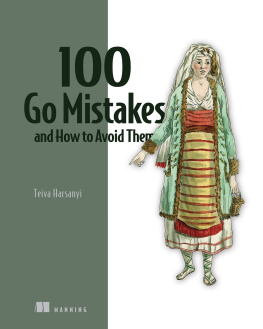
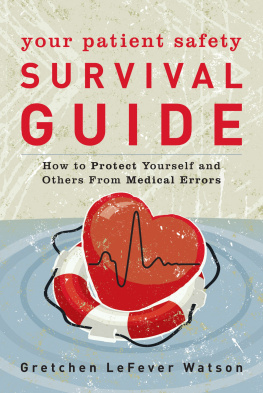
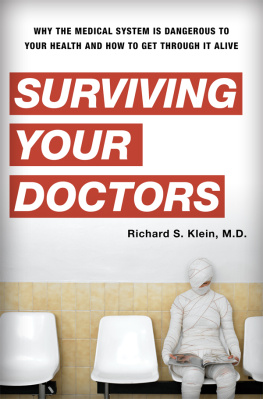
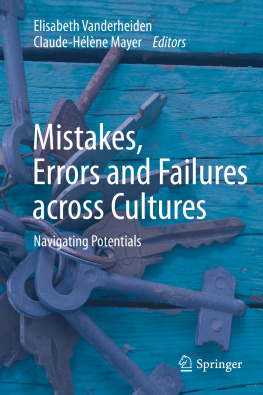
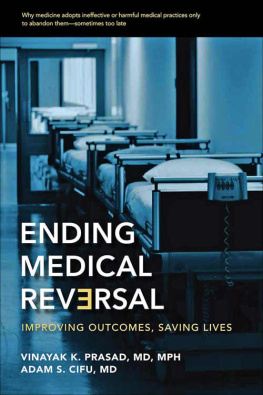
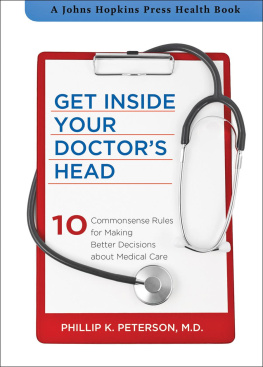
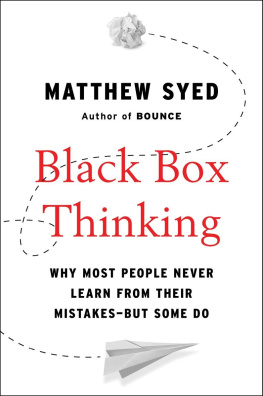
 TM The paper used in this publication meets the minimum requirements of American National Standard for Information Sciences Permanence of Paper for Printed Library Materials, ANSI/NISO Z39.48-1992.
TM The paper used in this publication meets the minimum requirements of American National Standard for Information Sciences Permanence of Paper for Printed Library Materials, ANSI/NISO Z39.48-1992.